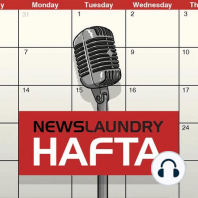2 min listen
Hafta 222: India Positive, Hindutva politics & much more
FromNL Hafta
ratings:
Length:
110 minutes
Released:
May 4, 2019
Format:
Podcast episode
Description
In this week’s episode, Abhinandan Sekhri is joined by Manisha Pande, Raman Kirpal, Anand Vardhan, and author Chetan Bhagat.The podcast kicks off with a deep dive into Bhagat’s book, India Positive: New Essays and Selected Column. The author explains that the title of his book is inspired by the idea of positivity. He believes that although there are several issues affecting the country, sitting for hours on Twitter and complaining about them will not make them go away. He says, “At the end of the day there are certain structural problems with India which are not necessarily Congress- or BJP-driven and we need to fix them and that’s positive to me.”When Abinandan questions Bhagat about putting a disproportionate amount of onus on the ordinary Indian to be self-employed in his book, he responds by saying, “I am not shifting the onus away from policymakers…[I’m] trying to protect the guy [ordinary Indian] …because you can’t keep fighting. Activism isn’t a very profitable trade for an individual.” He continues to say that the world is changing fast and the skill sets required are also going to change dramatically, merely defending a leader of a particular party on Twitter won’t conjure up an offer letter. The panel also talks about the dangers of the ‘messiah complex’.The panel also discusses the BJP's rise to power. Abhinandan says, “Bigotry was an acceptable price to pay for economic prosperity. For me, it's not but for a lot of people, it was.” Anand says, “When India became independent there was a subterranean domain of communalism which was not getting a politically-organised outlet. The historical processes are such that…any identity kind of politics finds an outlet…there is a kind of inevitability and it’s a kind of political catharsis for a lot of suppressed religious problems in the country.”The panel also talks about the Indian media's role in South Asia. Manisha talks about it in terms of the content produced and observes that the fundamental issues that plague journalism in India are “mediocrity of thought and group think”. She adds that there is a “complete disregard for readers and news consumers”. Raman talks about the increased dependence of media on government advertisements and says, “When they [media] are heavily dependent on the government the news automatically gets softer on them and this has happened at a very rapid pace of late.”For this and more, tune in! See acast.com/privacy for privacy and opt-out information.
Released:
May 4, 2019
Format:
Podcast episode
Titles in the series (100)
Bill Maher on the news media’s obsession with the new Pope and the child abuse scandal. by NL Hafta
